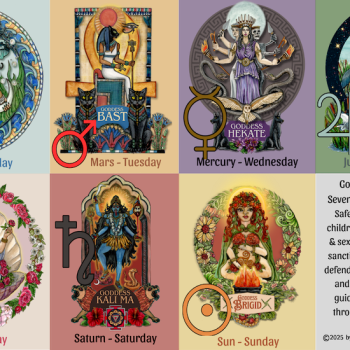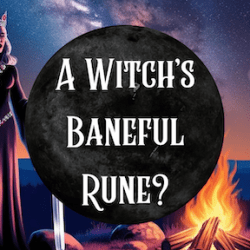Saturday afternoon, things got pretty exciting around The Sojourner, our earthy, witchy, metaphysical shop here in Greenville, North Carolina. For the first time in nearly nine years in business, we attracted the attention of not ONE, but TWO (unaffiliated) sidewalk-variety, preach-at-’em, “Christian” evangelists. EC Street Preacher set up his rig directly outside our front door holding a sign that reads: “WWJD: Who Will Jesus Damn?” followed by a list of sins and scripture references.
On his video from August 11th, he mentions finding us, saying: “I’ve seen a witchcraft store near the spot [where] I preach and I’m going to find a day and preach outside of there, as long as I can, as long as I have to. Because there’s no business any kind of store like that [has] being anywhere.”
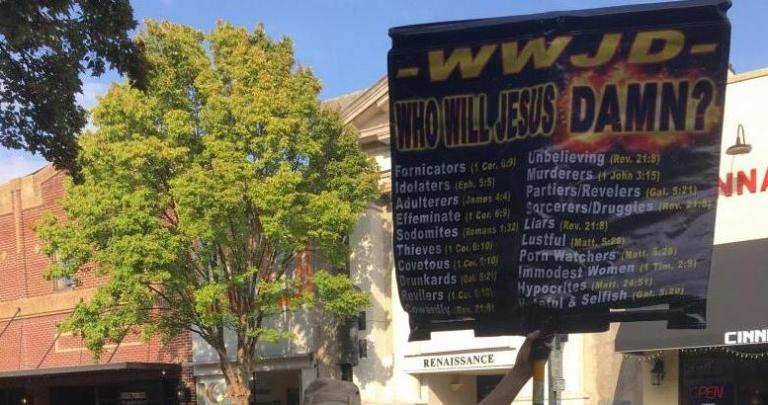
EC Street Preacher: Who Would Jesus Damn?
According to EC Street Preacher, the grievous sins for which his “Lord and Savior” would cast you into the Fires of Hell forever, include:
- Fornicators
- Idolaters
- Adulterers
- Effeminate
- Sodomites
- Thieves
- Covetous
- Drunkards
- Revilers
- Cowardly
- Unbelieving
- Murderers
- Partiers/Revelers
- Sorcerers/Druggies
- Liars
- Lustful
- Porn Watchers
- Immodest Women
- Hypocrites
- Hateful/Selfish (I think that is what it says.)
If he is correct, and we were to use this as a score card, (I can boast a 10) I’m gonna burn up nice and crispy. I do love a good drunken, immodest revel.
I think this is a highly selective list which illustrates this one man’s bias, wounds and fears. It is fascinating which things he chose to include with Old Testament references that were not mentioned by Jesus at all, like Sodomy. The real kicker is which things he chose to exclude, but have very famous stories of Jesus going berserk about, like money-changers in the Temple.

The Jesus Loves You Man
On the other end of the block, was the “Jesus Loves You Man.” I rather liked this jolly fellow who stood there quietly and talked to people who approached him, handed out his card with his legal name and contact information, and invited anyone who needed a friend in prayer to seek him out. While I’m not a fan of the Christian obsession with the torture device upon which their Messiah was murdered (The Cross,) I have to say that spreading the love of Jesus, rather than his condemnation, seems a more effective way to go. Though, the emphasis on donations does tweak me a smidge.
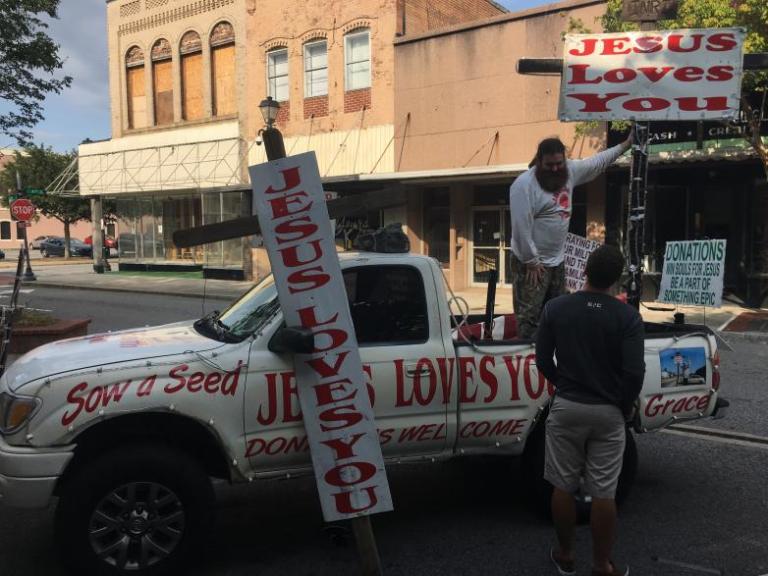
Two Priestesses, Odin’s Evangelist and EC Street Preacher Debate the Fine Points of Theology
The good news is that EC Street Preacher is a YouTuber on a sacred mission, and he posted a 58 minute video of our interactions on his channel. So, you too can enjoy the full glory, passion and hilarity of our afternoon. Caution: Do not watch this video while drinking beverages that may shoot out your nose, or near sleeping babies who will awaken as you guffaw loudly, especially there at the end when “Odin’s Evangelist” shows up.
It begins with his commentary about the experience, and how victimized he was by my “intolerance” of him “just standing there holding his sign” on our doorstep, condemning all our customers. In truth, I wasn’t “tolerating him” at all; I dislike the word tolerate as it is a back-handed rejection and condescension toward another human being, who I try to remember are all incarnations of the Divine. Though, I may have failed at this with a spiky word or two (old wounds run deep, y’all) I was accepting him as a fellow member of the priesthood, in service to Deity same as me, and offering him the respect of listening and engagement in civil religious discourse. I didn’t ask him to leave, because I was rather excited he was there to draw attention to our very existence, and bring our message to his viewers.
From a Google Search: Tolerance is “the ability or willingness to tolerate something, in particular the existence of opinions or behavior that one does not necessarily agree with.” Tolerance does not mean lack of engagement or lack of questions. Tolerance does not mean standing by while another does harm to your livelihood. (This was offered by my covenmate, Webweaver.)
My one religious taboo is proselytizing, so I usually just walk right by and ignore these yahoos – to each their own – but he brought it to my doorstep, and once you project your opinions into my domain, it is GAME ON. If I have to listen to your “witness”, you may be obliged to listen to mine. Plus, there is no such thing as bad publicity, folks. In fact, I found him on his YouTube channel and left a message that I enjoyed our talk and he was welcome back any time. I’ve found that victim-consciousness is a real problem among this type of evangelical.
Generally speaking, I LOATHE the presence of this inflammatory type of street preacher, because around our college town, they tend to be raging, raving, vulgar, and aggressive to innocent bystanders. I don’t think EC is mentally ill, or threatening, and as long as he remains a respectful witness, he is welcomed to find safe haven at our shop, just like everyone else.
Religious Trauma Syndrome is a real thing
I was raised by a woman just like EC, so I know its dangers first-hand. There is a psychiatric diagnoses for the variety of PTSD caused by the religious abuse EC is inflicting. Religious Trauma Syndrome. I felt compelled to share my mother’s story with him in the video, in hopes that her “witness” might do some good. I’ve also written extensively about her death and funeral in the Death Toll series, and how she haunted me rather than go into the light. She guarded, guided and inspired me to live my path authentically for four years, before she was able to speak directly to me through a Spiritual Medium. I tell that story in A Witch’s Carol: A Tale of Three Hauntings.
After I walk away, he is just sure that I was being deceived by a demon, and not the loving spirit of my Mother. I promise you this was not the case. Confirmation bias is also a real thing, sadly.
Odin’s Evangelist
The best part of the video is when a former employee of The Sojo shows up to stand beside him holding an “Odin’s ok with ’em” sign. Nate is an extremely well-educated Norse Heathen (Asatru,) hilarious, awesome on all accounts, and by far the most effective, non-combative heckler to a street preacher I have ever seen. Sadly, he doesn’t show up in much of the video, but you can see his reflection in the shop window, and hear their conversation. Y’all should all watch, listen, and take notes.
Then, if EC ever shows up to “Preach at us” again, I’ll send out the call and we all should show up with signs like this, and stand there just as calmly, and talk about our own mythologies and beliefs, because we all, including EC, have the freedom of speech and religion. Let’s exercise that right! I’m going to make a sign with all the things the Goddess suggests we do “as worship.” All acts of love and pleasure, y’all!

A Few Theological Points to Consider
The first person who came out to greet EC was our Apothecary Manager. Courtney is the very vision of the Goddess, a witch and priestess of beauty, grace, deep sensitivity and wisdom. She is an herbalist extraordinaire, with an *extensive* knowledge of plant-lore, history, usage for both medicinal and spiritual purposes – and a gift for snark that will set a fool on fire. So, this guy Godsplaining to her about how ancient herbal medicine worked is HILARIOUS to me. I would pay big money to hear the snarky thoughts running through her mind as he twists the translation of the Greek Word Pharmakia. This is his source for why Drugs, (and being a Drug Abuser, and/or a sorcerer) are sins.
We talked about how that word gets mistranslated into the King James version of the English bible as Witchcraft or Sorcery, Magickal Arts. Remember this gem from Exodus 22:18? “Thou shalt not suffer a witch to live.” He is referring to this line of thinking:
The Greek word “pharmakia” literally means “drugs”, and appears five times in the New Testament: in Gal 5:20, Rev 9:21, 18:23, 21:8, and 22:15. “Pharmakia” is translated into our English Bible as either “witchcraft” or “sorceries”. We also get our English word “pharmacy” from the Greek word “pharmakia”.
The King James Bible translators translated “pharmakia” as “witchcraft”, because almost no one but witches and sorcerers used drugs 400 years ago. Drugs were most commonly used in pagan worship to hallucinate and to try to get in touch with evil spirits…In Rev. 21:8, God says that people who are continually characterized by drug use will have no part in the Kingdom of God. Source at True Discernment by John
Drug Abuser, Healer, Sorcerer or Poisoner?
Now, I was taught that the mis-translation from the Greek to become “Witch” was from a Hebrew word that means a poisoner, or someone who knew the poisonous properties of plants and used them to harm people. We cannot even guess how many innocent herbal healers were accused of “witchcraft” and violently murdered over the centuries thanks to this translation bias, but it killed a LOT of folks. I think this passage was intended to mean: Suffer not a murderous poisoner to live. That is something I sort-of agree with, but with less violence, perhaps a friendly binding spell, or banishment. More like this source:
Definition: Pharmakeia
- the use or the administering of drugs
- poisoning
- sorcery, magical arts, often found in connection with idolatry and fostered by it
- metaph. the deceptions and seductions of idolatry Source at Bible Study Tools
Just for shits and giggles, I went to look up Revelations 21:8 mentioned above, and because it was on his sign, and I can see why EC Street Preacher would have his knickers all in a bunch about a Witchcraft shop that specializes in selling occult goods and organic, bulk herbs in our Medicinal and Magickal Apothecary.
Revelation 21:8 (NIV)
“But the cowardly, the unbelieving, the vile, the murderers, the sexually immoral, those who practice magic arts, the idolaters and all liars—they will be consigned to the fiery lake of burning sulfur. This is the second death.”
“Fiery lake of burning sulfur,” Huh? That is a really sweet love note he is dropping on my doorstep. We do love us some idols and magickal arts, and I don’t believe a single word of Revelations to be anything more than the ravings of someone who got into the funny mushrooms, or the Ergot-riddled grain, and had a bad trip.
Though, I’d remind him that Jesus himself didn’t say anything in Revelations. Biblical scholars generally attribute that vision and writing to some guy named John who was NOT the apostle, writing in Greek, sometime during the reign of the Emperor Domition A.D. 81 – 96. Here is a good patheos article about the sources of Revelations.
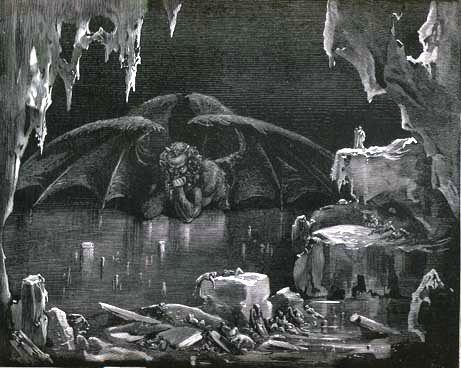
On the Creation of Hell and Satan
In the video, you’ll hear me challenge him by saying that Hell was a creation of that Catholic church to control people with fear. I was thinking about the influences that John Milton and his epic poem, Paradise Lost, had on Christian Theology in the Renaissance, and is the currently fashionable vision of Satan, and Hell.
“Paradise Lost is an epic poem…by the 17th-century English poet John Milton (1608–1674). The first version, published in 1667…The poem concerns the biblical story of the Fall of Man: the temptation of Adam and Eve by the fallen angel Satan and their expulsion from the Garden of Eden. Milton’s purpose, stated in Book I, is to “justify the ways of God to men”.
Satan is the first major character introduced in the poem. Formerly called Lucifer, he was the most beautiful of all angels in Heaven, and is a tragic figure who describes himself with the now-famous quote “Better to reign in Hell than serve in Heaven.” He is introduced to Hell after he leads a failed rebellion to wrest control of Heaven from God. Satan’s desire to rebel against his creator stems from his unwillingness to be subjugated by God and his Son, claiming that angels are “self-begot, self-raised,” and thereby denying God’s authority over them as their creator.” Wikipedia
However, I more accurately should have said “middle ages” because it was Dante’s vision of hell, sin, and “Satan” as this demonic, winged beast, rather than a fallen angel of light (Lucifer,) that informed Milton’s work, and continued to shape the Western world view of these concepts.
Inferno Italian for “Hell” is the first part of Dante Alighieri’s 14th-century epic poem Divine Comedy. It is followed by Purgatorio and Paradiso. The Inferno tells the journey of Dante through Hell, guided by the ancient Roman poet Virgil.” Wikipedia
But where did Dante get such ideas? In this very informative article: Hell: Origins of an Idea by Richard Burky and Jeannette B. Anderson, they trace it back to Augustine in the Fourth Century, whom we can thank <snark> for damnation by “original sin.”
“Playing a key role in the development of the Christian doctrine of an ever-burning hell was Augustine, the influential fourth-century bishop of Hippo in North Africa. A leading definer of subsequent Christian faith, he wrote a number of books…
Augustine wrote that “hell, which also is called a lake of fire and brimstone, will be material fire, and will torment the bodies of the damned.” He also wrote of “those everlasting pains which are to follow” the final judgment (City of God 21.10, 13). The bishop argued that every child born is immediately and automatically condemned by Adam and Eve’s first sin…Augustine’s arguments are held up even now as foundational to what many Christian churches believe and teach.
Nearly a thousand years after Augustine, the Italian Dante Alighieri wrote The Divine Comedy. Dante was a committed Roman Catholic, a politician, a poet and a philosopher. His work, like Augustine’s, is considered one of the cornerstones of Western religious ideas…His gruesome picture of hell has taken root in Western society, having inspired such notables as Michelangelo, Gustave Doré, Sandro Botticelli, John Milton and T.S. Eliot.” Source
At any rate, these modern ideas of the seven deadly sins, the firey sulfurous pit into which God the Father will damn you, and Satan, their agent of Evil, were certainly not the same ones held by Yeshua of Nazareth, the Jewish Rabbi. On that I will stake my entire reputation.
Reasonable Christian preachers who would agree with me: John Shelby Spong
My favorite voice against this horrific concept of hell that binds so many people of Abrahamic faiths in fear, is this video of retired Episcopal bishop, John Shelby Spong, from 2006. I understand that he was a local priest here in Eastern NC, early in his career. I just adore this fellow.
https://www.youtube.com/watch?v=LkaH3hEmV3M
“Spong: I don’t think Hell exists. I happen to believe in life after death, but I don’t think it’s got a thing to do with reward and punishment. Religion is always in the control business, and that’s something people don’t really understand. It’s in a guilt-producing control business. And if you have Heaven as a place where you’re rewarded for you goodness, and Hell is a place where you’re punished for your evil, then you sort of have control of the population. And so they create this fiery place which has quite literally scared the Hell out of a lot of people, throughout Christian history. And it’s part of a control tactic.
Morrison: But wait a minute. You’re saying that Hell, the idea of a place under the earth or somewhere you’re tormented for an eternity – is actually an invention of the church?
Spong: I think the church fired its furnaces hotter than anybody else. But I think there’s a sense in most religious life of reward and punishment in some form. The church doesn’t like for people to grow up, because you can’t control grown-ups. That’s why we talk about being born again. When you’re born again, you’re still a child. People don’t need to be born again. They need to grow up. They need to accept their responsibility for themselves and the world.”
If I may make a request of you, dear reader:
If you’ve watched the YouTube video of EC’s above, I encourage you to leave a thoughtful, reasonable comment on his video in support of paganism, or challenge him in some way, but let’s not act like trolls, okay? Let’s raise the bar on this conversation, not lower it as their evangelical internet trolls are want to do. Share this link widely for me, and we’ll fire up the lighthouse flames a little brighter together. I know that I am not intimidated by this attention, and would like to transmute it into some change for the better in this tumultuous time.
Thanks!
Heron








